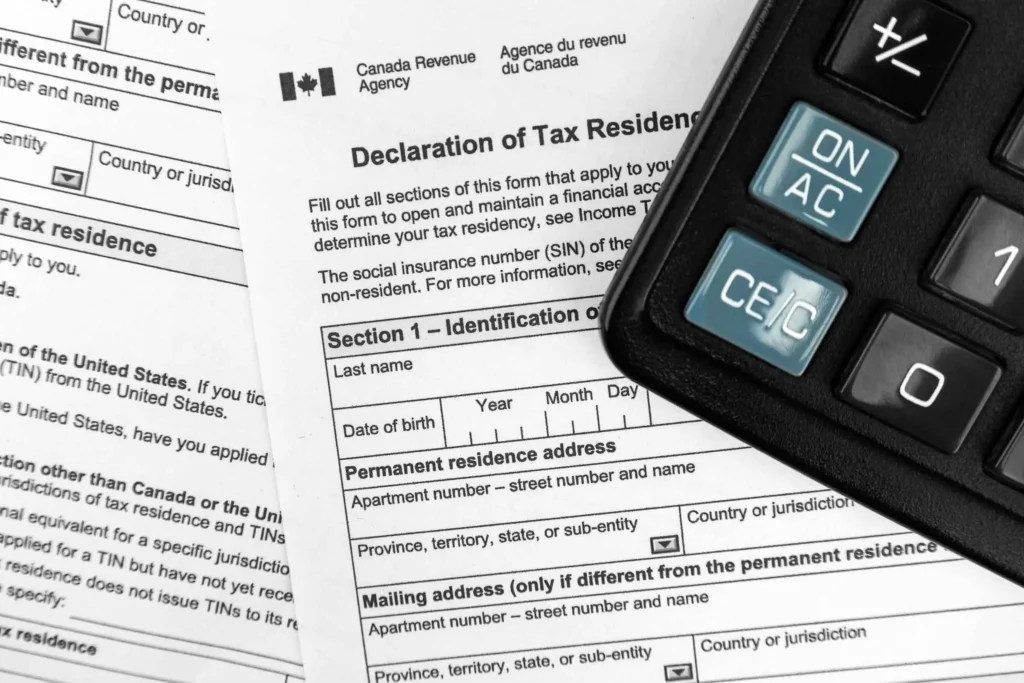Exiting Canada residency in 2026: Complete legal guide with 7 essential steps, tax implications, and investment residency options for Canadian investors.
Due to growing discontent at home, more and more Canadians are considering leaving Canada and obtaining residency in destinations such as Europe and the Caribbean.
Many are doing so through residency-by-investment or citizenship-by-investment programs. These programs allow qualified investors to obtain a second residency or citizenship by making approved investments abroad.
For Canadians considering relocation, executing a legal exit from Canada requires careful planning and expert guidance. The process is far more complex than simply moving abroad, it involves formally severing residential ties, understanding the Canada Revenue Agency (CRA) rules on departure tax, and determining when you are no longer considered a Canadian tax resident. Without proper planning, investors risk triggering deemed disposition taxes, facing double taxation, or falling into non-compliance with CRA regulations.
Understanding Canadian Tax Residency
Canadian tax obligations are based on residency, not citizenship. This means that even after you leave Canada and haven’t followed the correct procedure, you may still be considered a Canadian tax resident, and therefore subject to Canadian income tax.
Understanding how residency status is determined is the most important part of preparing a legal exit from Canada and avoiding costly tax implications.
How Canada Taxes Based on Residency, Not Citizenship
Unlike countries that impose taxation based on citizenship, Canada’s tax system is residency-based. The Canada Revenue Agency (CRA) determines the tax status by examining factors such as residential ties, including the location of the resident’s home, spouse, dependents, and personal assets.
If someone is considered a Canadian tax resident, their worldwide income is taxable in Canada. After becoming a non-resident, only Canadian-sourced income (such as rent or dividends) remains taxable, often at withholding rates.
For high-net-worth individuals and investors, this difference creates opportunities for international tax planning and residency diversification. Many Canadians pursue residency-by-investment or citizenship-by-investment programs abroad to establish tax residency in more favourable jurisdictions, provided they also meet the CRA’s requirements to sever residential ties with Canada.
Why Canadian Investors Consider Changing Tax Residency
For many investors, exiting Canada is both a lifestyle and financial decision. High personal tax rates, limited deductions, and uncertainty surrounding future Government policies have seen more Canadians considering international tax optimization options.
By establishing non-resident status, Canadians can benefit from:
- Reduced global tax exposure, particularly for those with international assets or passive income streams.
- Access to investor-friendly jurisdictions, such as those in Europe or the Caribbean, which offer Golden Visa and Citizenship by Investment programs.
- Improved estate and succession planning, especially for families managing intergenerational wealth.
- Enhanced global mobility and diversification, providing flexibility to live, work, or retire abroad while maintaining global investments.
Your Roadmap to Ending Canadian Tax Residency
Successfully exiting Canada legally and becoming a non-resident involves more than simply relocating abroad. The Canada Revenue Agency (CRA) looks at the strength of your connections to Canada and the establishment of new ones abroad.
Below is a roadmap outlining the key steps every investor should follow when planning to end Canadian tax residency legitimately.
Breaking Your Main Connections to Canada
The CRA places heavy emphasis on a person’s primary residential ties, which typically include your home, spouse or common-law partner, and dependents. To be considered a non-resident of Canada for tax purposes, these main ties must be formally severed or re-established abroad.
Selling or renting out your Canadian residence, relocating your spouse and family, and ensuring dependent children no longer reside in Canada should be the first steps. By reestablishing these ties abroad, the CRA will view this as a strong indicator that you have permanently left Canada and no longer maintain significant personal or economic presence.
Minimizing Your Secondary Canadian Connections
As well as the primary ties, the CRA will also consider a range of secondary residential ties. Examples of secondary ties include maintaining Canadian bank accounts, credit cards, a driver’s licence, health coverage, memberships, personal possessions, or even social connections within Canada.
While it may not be necessary to sever all secondary connections, anyone interested in becoming a non-resident for tax purposes should aim to minimize them as much as possible. The more secondary ties you retain, the higher the risk that the CRA will continue to treat you as a Canadian tax resident.
Need more information? read about complete guide about Severing Ties with Canada Legally
Building Your New Life Abroad
To confirm non-resident status, it’s important to establish residential and economic ties abroad. This includes renting or purchasing property, obtaining a residence permit, opening local bank accounts, and spending substantial time in your new country.
Many investors choose to leave Canada through Residency by Investment or Citizenship by Investment programs, such as Golden Visa options in Europe or citizenship programs in the Caribbean. These programs provide not only new tax residency options but also enhanced mobility and wealth protection.
Completing Your Final Canadian Tax Filing
Before you can officially become a non-resident in Canada, you must file a departure tax return for the year you emigrate. This filing formally notifies the CRA of your change in residency status and outlines your worldwide income earned up to the date of departure.
The departure return ensures you meet all reporting obligations and prevents future disputes over Canadian non-resident tax status. It’s also your opportunity to declare any assets subject to departure tax (also known as deemed disposition).
Navigating Your Exit Tax Obligations
When you are no longer considered a Canadian tax resident, you may be deemed to have disposed of certain assets at fair market value. In such a situation, a departure tax on unrealized capital gains may be applied. This “deemed disposition” rule applies to most investments, including shares, certain properties, and interests in private corporations.
Requesting Official CRA Confirmation (Optional)
While not a mandatory requirement, some taxpayers choose to request an official CRA determination of residency status using Form NR73 (Determination of Residency Status – Leaving Canada). This form allows the CRA to review your situation and provide a written opinion on whether you are a non-resident for tax purposes.
However, this form should be used carefully. It may be useful if your circumstances are complex or if you anticipate questions arising in the future. However, unnecessary filings can complicate future compliance. Always seek legal advice before submitting Form NR73.
Finalizing Your Canadian Affairs
Before you officially complete your exit from Canada, it’s important to properly finalise any remaining domestic obligations. This may include notifying your financial institutions, updating your address and residency status, cancelling or converting Canadian health coverage, and reviewing insurance policies or corporate directorships.
Completing the above and making sure that all personal and professional ties are properly documented highlights your clear intent to sever ties with Canada and supports your non-resident tax position under Canada tax residency rules.
Read Also: Deemed Disposition Canada: Complete Legal Guide
Popular Destination Countries for Canadian Investors
Once the decision has been made to leave Canada and become a non-resident, the most important step is to choose the Golden Visa or Citizenship by Investment program that best suits your needs. For many Canadians, the choice goes beyond lifestyle. It’s about finding the best options for global mobility, tax optimization, and long-term investment.
The most popular destinations are countries that offer golden visas or citizenship-by-investment programs. These programs offer residence rights or second citizenship in exchange for qualifying investments.
While the Caribbean offers fast-track citizenship options best suited for global mobility and asset protection, Europe’s Golden Visa programs are a good choice for those seeking residence in stable economies with access to the Schengen Area.
Below are some of the most popular programs chosen by Canadian investors looking to exit Canada legally.
European Golden Visa Programs
Europe remains a top destination for Canadians seeking both lifestyle and long-term security. With a variety of Golden Visa programs on offer, investors can obtain residency by investment in exchange for real estate purchases, government bonds, or qualifying capital contributions.
European Golden Visa programs allow investors and their families to live, work, and travel freely across Europe’s Schengen Zone, while offering potential eligibility for citizenship after the applicable eligibility criteria have been met.
Portugal Golden Visa
Portugal’s Golden Visa is one of Europe’s most flexible residency-by-investment programs, ideal for Canadians seeking residency in an EU country with minimal physical stay requirements. Investors can secure residency with an average stay of just seven days per year while maintaining full access to the Schengen Area.
The minimum investment threshold begins at €500,000 through a qualified investment or venture capital fund focusing on Portuguese businesses. Alternatively, a €250,000 donation (or €200,000 in low-density regions) may be made toward cultural or heritage projects.
For Canadians, the Portugal Golden Visa offers significant lifestyle and mobility advantages: visa-free access to Schengen Area members, the right to live, work, and study in Portugal, and eligibility for EU citizenship after five years and meeting the minimum stay requirements (just 14 days within the first two years and 21 days over the following three) without renouncing Canadian nationality.
Greece Golden Visa
Greece’s Golden Visa remains one of Europe’s most popular residency-by-investment programs due to its flexible structure, opportunities to make a qualifying investment via real estate, and visa-free Schengen access.
To be eligible for this program, applicants must make a qualifying investment. Current eligible investments include:
Real Estate
Investors have the flexibility to choose from a variety of real estate investments including:
- Minimum investment of €800,000 in a property in the entire Administrative Region of Attica (includes Piraeus and most of the capital region), the Regional Units of Thessaloniki, Mykonos, Santorini, islands with a population of over 3,100 inhabitants; or
- Minimum investment of €400,000 in a property in other areas
The investor must buy a single property with a minimum area of 120m2, and can’t offer the property for short-term rentals.
An investor can qualify for a minimum investment of €250,000 if they convert commercial properties to residential use or restore listed buildings of historical or cultural significance, regardless of size or location.
Other Qualifying Investments
Greece also offers non-property investment options for applicants as well, including:
Long-Term Lease or Timeshare – Enter into a 10-year timeshare or lease agreement for hotel accommodation or furnished tourist residences. The minimum investment ranges from €400,000 to €800,000 depending on the property’s location.
Bank Deposit – Place a fixed-term deposit of at least €500,000 in a Greek credit institution.
Capital Contributions – Invest a minimum of €500,000 into a public limited real estate investment company (the company must focus exclusively on Greece), or contribute to a closed-end investment company, mutual fund, or share capital increase of a Greek-based business.
Government Bonds – Purchase at least €500,000 in Greek government bonds with a remaining maturity of three years or more. The investment must be made through a Greek credit institution.
Listed Securities – Invest €800,000 in shares, corporate bonds, or government bonds traded on Greek regulated markets or multilateral trading facilities.
Mutual or Alternative Investment Funds – Invest at least €350,000 in a mutual fund or alternative investment fund that invests exclusively in Greek assets, including corporate bonds, government bonds, or listed equities.
For Canadian investors, Greece offers a European base with no minimum physical stay requirement, full family inclusion, access to public healthcare and education, and a potential option to apply for Greek citizenship after seven years of residence.
Caribbean Citizenship by Investment Programs
For Canadians looking for a more permanent alternative to the European residency programs, Caribbean Citizenship by Investment (CBI) programs offer an excellent opportunity for achieving second citizenship and wealth planning and optimization possibilities.
These programs provide a direct path to dual citizenship in exchange for a qualifying investment.
Antigua and Barbuda CBI
Antigua and Barbuda’s Citizenship by Investment (CBI) Program has become a top choice for investors who have families seeking second citizenship in the Caribbean. Renowned for its simplicity and family-friendly structure, the Antigua and Barbuda Citizenship by Investment Program offers lifetime citizenship, global mobility, and tax advantages including, no personal income, inheritance, or capital gains taxes.
Citizenship is granted for life and extends to the applicant’s dependents. Eligible dependents include a spouse, children up to 30 years old, parents over 55, and unmarried siblings of the main applicant or spouse.
Holders enjoy visa-free or visa-on-arrival access to over 150 destinations, including the UK and Schengen Area, along with the right to live and work in other CARICOM member states.
Applicants can choose from the following investment options:
National Development Fund (NDF) Contribution
The NDF is a non-refundable contribution to a government fund that supports public-private partnerships and national development initiatives in Antigua and Barbuda.
To qualify under this option, a non-refundable contribution of USD 230,000 is required. In addition to the investment, a government processing fee applies as follows:
- USD 10,000 for a single applicant
- USD 20,000 for a family of up to four
- For families with more than four members, the US$ 20,000 fee applies, plus an additional USD 10,000 is charged per dependent starting from the fifth applicant
Real Estate Investment Option
Applicants must invest in government-approved real estate with a minimum value of USD 300,000. Properties must be held for at least five years, or replaced with another approved property if sold earlier.
Eligible projects include luxury resorts, branded residences, and boutique developments. This route is ideal for those seeking a tangible asset alongside second citizenship.
University of the West Indies (UWI) Fund Option
Designed for families of six or more, this option allows applicants to make a non-refundable contribution of USD 260,000 to the UWI Fund. It includes one year of tuition-free study for one family member at the University of the West Indies.
Government processing fees are waived under this route, making it an attractive option for large families.
Business Investment Option
This route allows applicants to invest in an approved business within Antigua and Barbuda. The required investment is either:
- USD 1.5 million as a sole investor
- USD 400,000 per applicant in a joint investment totaling at least USD 5 million
St. Kitts and Nevis CBI
Launched in 1984, St. Kitts and Nevis offers the world’s first Citizenship by Investment program.
The program offers St. Kitts and Nevis citizenship, visa-free or visa-on-arrival access to over 140 countries, no personal income tax, and the ability to include family members in a single application
Applicants can choose between the following qualifying investment options:
Sustainable Island State Contribution (SISC)
The SISC requires applicants to make a non-refundable contribution of USD 250,000 (for a family of up to four) directly to the government.
The SISC is a popular choice due to its simplicity and speed, with most applications processed within three to six months.
Public Benefit Option (PBO)
The Public Benefit Option allows investors to contribute USD 250,000 to a government-approved public project that promotes economic growth for St. Kitts and Nevis.
Approved Private Real Estate Investment
The Approved Private Real Estate Investment option allows applicants to invest in designated residential properties. Investors can choose between two categories:
- A condominium unit or share in an approved real estate development with a minimum investment of USD 325,000
- A single-family private home designated as Approved Private Real Estate with a minimum investment of USD 600,000
To maintain eligibility under the Citizenship by Investment program, the property must be held for a minimum of 7 years. If the real estate investment is sold before the end of this 7 year holding period, the initial investment will not qualify for a future CBI application unless the Federal Cabinet is satisfied that substantial additional investment has been made, whether through significant construction, renovation, or other approved improvements.
Approved Real Estate Development Shares
This investment option allows investors to purchase shares in government‑approved real estate developments with a minimum investment of US 325,000. It offers co‑ownership in luxury resorts, eco‑friendly estates, or beachfront communities.
Choosing the Right Destination
Selecting the right country for relocation is the most important decision when exiting Canada. Investors must carefully consider how each program satisfies their tax, lifestyle, and long-term goals. Important factors to consider include:
Investment Requirements
Each residency-by-investment (RBI) and citizenship-by-investment (CBI) program is designed to cater to different investor profiles.
For instance, European Golden Visa programs such as those offered by Portugal, Greece, and Malta typically require minimum investments ranging from EUR 250,000 to EUR 500,000, whether through real estate or qualifying investment funds.
By contrast, Caribbean CBI programs such as St. Kitts & Nevis or Antigua & Barbuda start from around USD 200,000 to USD 250,000, offering faster processing times and lower overall costs.
Timeline Requirements
Each country offers different processing times and physical presence requirements. For Canadians seeking quick global mobility or asset diversification, Caribbean programs can grant citizenship in as little as three to six months, with no residence requirement.
European residency-by-investment programs may take longer but provide permanent residence and eventual access to EU citizenship.
Lifestyle and Business Needs
Each destination also offers distinct advantages depending on your personal and business priorities.
For investors who prioritize access to Europe, education, and infrastructure, countries such as Portugal and Greece provide established ecosystems for entrepreneurs and families.
For those focused on asset protection, global banking access, and simplified tax systems, the Caribbean CBI jurisdictions are a better option.
Path to Citizenship vs. Residency Only
Finally, the choice between residency and citizenship is another important consideration when deciding which program is best suited to the applicant’s needs.
A residency-by-investment program grants residence rights and may lead to citizenship after several years, provided certain conditions (stay periods, language, integration) are met.
Whereas citizenship-by-investment (CBI) programs grant immediate citizenship, offering greater security in relation to Canadian tax residency obligations once residential ties are severed.
Why Exit Planning Requires Expert Support
Successfully exiting Canada legally involves completing a complex process. Each step, from determining your Canadian tax residency status and calculating departure tax, to meeting the residency or citizenship requirements of your chosen destination must be properly prepared. Any mistakes made during this process can have significant financial and legal consequences, including exposure to double taxation, penalties for non-compliance, or denial of non-resident status by the Canada Revenue Agency (CRA).
Exiting Canada is both legal and achievable when approached correctly. The roadmap outlined in this guide provides the foundation for managing your departure tax, confirming non-resident status, and selecting a destination that aligns with your financial and lifestyle objectives. Whether through a European Golden Visa or Caribbean Citizenship by Investment, there are several possible pathways available for Canadians.
Read Also: Leaving Canada? In-Depth Guide to Canadian Tax Residency Rules by Immigration Lawyers
How Harvey Law Group Can Help
Harvey Law Group brings over 32 years of immigration expertise with offices in 20 countries globally, including major hubs like Hong Kong, Paris, Miami, and Montreal. Our specialized knowledge of European Golden Visa and Caribbean Citizenship by Investment programs is available to clients.
Our services cover the entire process, from exit planning and investment selection to document preparation, submission, and renewals. Whether your goal is Schengen access, eventual EU citizenship, or an immediate second citizenship and portfolio diversification, HLG ensures a smooth and compliant process.
Contact our experts for a personalized program comparison and more information about which program is best suited to your needs, whether you are eligible and how to get started.




